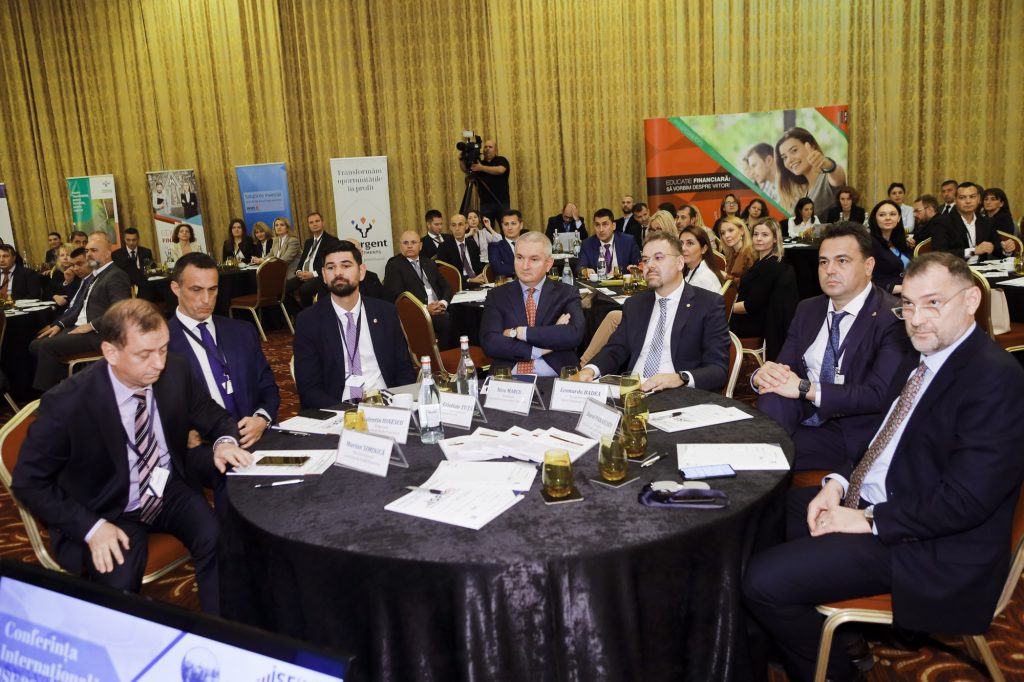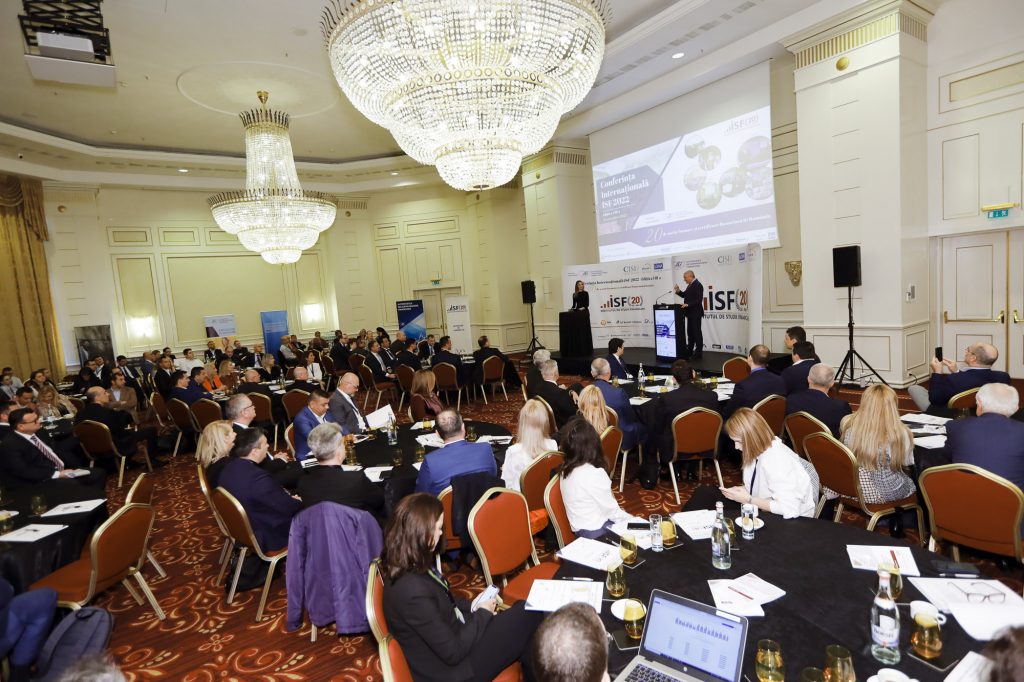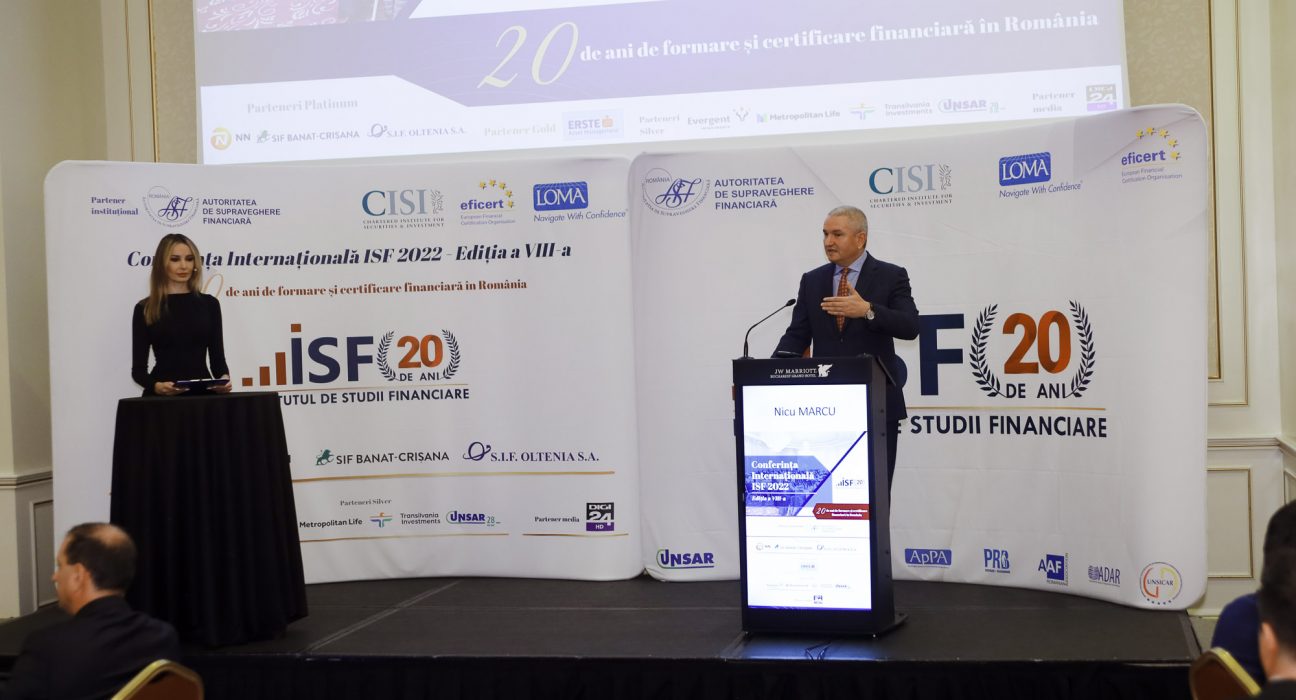The Institute of Financial Studies organized the 8th edition of the ISF 2022 International Conference on November 10, 2022. The event celebrated 20 years of financial training and certification in Romania by ISF, attended by prominent participants who analyzed the current geopolitical and macroeconomic context at the global level and its influence on the stability of European financial markets.
The event was attended by representatives of the Financial Supervisory Authority, the National Bank of Romania, the Parliament, the European Insurance and Occupational Pensions Authority (EIOPA), the Bucharest Stock Exchange, representatives of the academic community, and entities operating in non-banking financial markets.
At the start of the discussions, participants in the plenary session of the ISF 2022 International Conference analyzed macroeconomic, geopolitical, and climate risks in the development of financial markets, financial intermediation and its impact on private sectors, challenges in the non-banking financial sector, artificial intelligence and financial services, as well as the future of financial certifications globally and solutions to promote the digitalization of financial markets.

The second part of the conference consisted of a workshop dedicated to financial education, the role and involvement of ISF in professional training programs for tens of thousands of students, pupils, teachers, and employees of companies across the country, who learned how to protect their incomes.
The 8th edition of the ISF International Conference in 2022 identified post-pandemic elements that influenced the financial services sector while also drawing attention to upcoming political, digital, social, and economic threats.
The ASF President urges actors in the three non-banking financial markets to exercise extreme caution
In a challenging economic context, we will need to act with great caution to maintain the financial stability of the supervised markets, this was the essence of the message delivered by Prof. univ. dr. Nicu Marcu, President of the Financial Supervisory Authority, during the 8th edition of the ISF International Conference.
In the official opening of the event, Mr. Nicu Marcu, President of ASF, emphasized: “Recently, we have been witnessing a succession of crises. We have never before encountered such a difficult situation, referred to by some economists as a ‘perma-crisis’: these overlapping crises of energy, economy, food, and others. It will likely be quite challenging to overcome this moment. Therefore, the role of ASF, the institution I represent, is decisive in ensuring proper supervision of financial markets and overcoming potential shocks that may arise. To protect consumers as effectively as possible, ASF will intensify its inspections in the coming period and maintain rigorous oversight. Our goal is not to alarm the markets but to ensure, together with you (representatives of the financial markets, ed.), that our objectives are met.”
Regarding ISF’s activities, President Nicu Marcu noted: “After two and a half years in office, I am satisfied with the progress of the Institute of Financial Studies and the competence demonstrated by the leadership team through everything they have accomplished so far. (…) I commend the Institute’s role in professionalizing the market, raising public awareness about financial education, and managing public funds.”
Prof. univ. dr. Nicu Marcu, President of the Financial Supervisory Authority
The COVID-19 pandemic significantly impacted non-banking financial markets, both through changes in workflows across all sectors and by altering the Romanian population’s views on insurance, savings, and financial planning for the future. However, the post-pandemic context was compounded by the outbreak of war in close proximity, which radically altered international economic relations, heightened the risk of recession in Europe, deepened the poverty of certain communities, and amplified inflationary pressures felt by both citizens and companies.
BNR Deputy Governor, Leonardo Badea, on the economic context, the critical importance of digitalization, and the need for financial education
Present at the ISF 2022 Conference, the Deputy Governor of the National Bank of Romania, Mr. Leonardo Badea, emphasized that “we are in a period of the three ‘Cs’: conflict, crisis, and climate change. Therefore, we must carefully calibrate our positions and prepare for what lies ahead. The financial system faces a challenging 2023. The trends that will persist include: a heightened need for savings, personalization of services based on consumer needs, and an increasing demand for digitized financial services. The importance of financial education is evident. European organizations prioritize this phenomenon. The UN’s 2030 Agenda establishes quality financial education as a priority and a vector for reducing social inequality. The increased effort for financial education is supported by many aspects of economic and social life.”
Prof. univ. dr. Leonardo Badea, Deputy Governor of the National Bank of Romania

The 8th edition of the ISF International Conference in 2022 presented a precise analysis of the post-pandemic elements that influenced the financial services sector in Romania, highlighting climate risks in the development of financial markets, as well as investment solutions for a stronger European Union. It also emphasized the need for financial education to lead to the creation of a broader class of citizens who know how to turn savings into investments.
“The future of work is now, and we must address this change from all perspectives: legislation, IT, budget. Digitalization saves time. ISF is appealing from the perspective of identifying new solutions to work more efficiently or to make money work for us. Amidst all these overlapping crises, we often hear, perhaps too often: ‘let’s save!’ But financial education must become the method through which people learn to earn more money. If we focus solely on saving, we can say goodbye to innovation and prosperity. Without the flow of money that keeps the economy alive, I fear we will become the poorest champions of saving.”
George-Cristian Tuță, Quaestor of the Chamber of Deputies
The Institute of Financial Studies brought together prominent figures from the financial, political, insurance, and academic sectors at the “ISF 2022 International Conference – 20 Years of Financial Training and Certification in Romania.”
“The business environment is extremely challenging, a situation we have never encountered before. It is a challenge for all market players but also for universities. We, too, must contribute to the development of young people. We aim to develop programs in the field of digital technology because that is the future. Digitalization has a real impact on the operational side.”
Prof. univ. dr. Dorel Paraschiv, Vice-Rector of the Academy of Economic Studies in Bucharest
The ISF 2022 International Conference provided a unique opportunity to underscore the importance of partnerships in financial education: “We have achieved our goal of becoming an integrator of financial education events, bringing together the three categories of stakeholders: the regulatory authority, the financial market, and the academic community.”
Prof. univ. dr. Marian Siminică, Executive Director of the Institute of Financial Studies
extracrted from www.studiifinanciare.ro.

